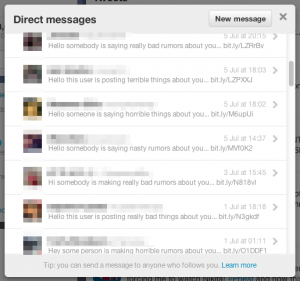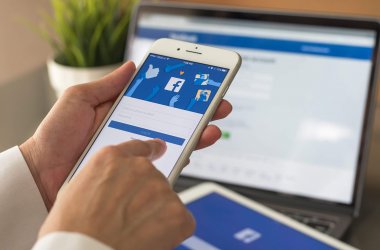Cyber criminals are using compromised Twitter accounts to distribute messages disguised as coming from friends who suggest recipients click on a link to see themselves on a Facebook video.
Sophos reported the trick after receiving a number of reports from readers of the vendor’s blog. The link carried in the direct messages to Twitter users points to a website that tries to install malware onto a PC.
Sophos described two types of messages used by the spammers. One carried the note “your (sic) in this (link to page on Facebook.com) LoL,” and the other read: “you even see him taping u (link to page) that’s (sic) awful.”
People who click on the link see what looks like a video player warning them that an “update to YouTube player is needed.” The page goes on to say that it will install an update to Flash Player 10.1.
What the page actually does is install a backdoor Trojan that Sophos calls Troj/Mdrop-EML. How the criminals have hijacked Twitter accounts is unclear, Sophos said. People who find that their accounts have been compromised should change their password immediately and revoke permissions to any suspicious applications with access to their accounts.
The widespread use of social networks, particularly Facebook, Twitter and LinkedIn, has made them prime targets for cybercriminals. IBM reported in March a surge in phishing emails impersonating social media sites.
Many people offer a wealth of information on their personal and professional lives on the sites, giving criminals lots of fodder for crafting an email to lure recipients to a malicious Web page.
The threat to businesses is also increasing, as more companies give employees access to social networks to interact with customers and launch and manage marketing campaigns.
This trend includes even highly regulated industries, such as financial services. A survey by Socialware found that 84% of financial advisers used social networks for business in 2011, up from 60% in 2010.
The need to consider security in the use of social networks is reflected in the numerous examples of companies having their accounts hacked. In 2011, hackers compromised Microsoft’s YouTube channel, defaced Pfizer’s Facebook page and swapped content on Sesame Street’s YouTube channel with pornography, a recent Sophos report said.
On Twitter, hackers took over NBC News’ account and sent fake tweets reporting an attack on Ground Zero on the anniversary weekend of 9/11.
A major reason hackers are successful on social networks is sloppy password security, Sophos said. In addition, social networks need to beef up the security offered to accounts that represent brand names.
Facebook has acknowledged in regulatory filings that it has millions of “undesirable” user accounts, which are likely to be spewing spam. The disclosure in August highlighted the need for caution when using the site.
Data released last December by Barracuda Networks research scientist Daniel Peck showed that 1 in 100 posts on Twitter are spam or malicious.






